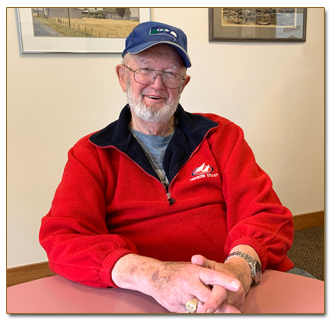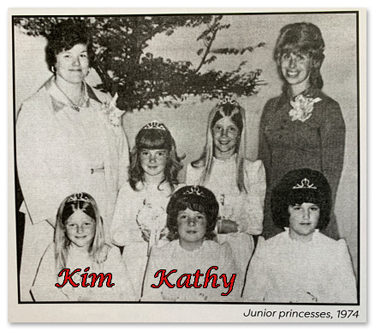KEITH HERRING
Oral History Project
On April 24, 1952 he pitched the first no-hitter baseball game for the Siuslaw Vikings in his junior year against Reedsport. He was known for having a “good pitching arm”, and attended baseball school in Florida at 18 years old. Keith went on to play for 2 semi-professional teams.
 As with most interviews I schedule, I never actually meet the person until the day of the interview. That’s probably what I like best about interviewing people for the museum’s Oral History Project– I get to meet people I never would have otherwise. And so it was with Keith Herring. Shortly after the interview began, it was apparent Keith was a gentle, maybe a bit shy, humble person. At first, he wasn’t as forthcoming with details of his life. The longer we sat though, the more he became comfortable speaking about himself and his early years in Florence. I found it was just a matter of being patient, and letting the memory and stories reveal itself.
As with most interviews I schedule, I never actually meet the person until the day of the interview. That’s probably what I like best about interviewing people for the museum’s Oral History Project– I get to meet people I never would have otherwise. And so it was with Keith Herring. Shortly after the interview began, it was apparent Keith was a gentle, maybe a bit shy, humble person. At first, he wasn’t as forthcoming with details of his life. The longer we sat though, the more he became comfortable speaking about himself and his early years in Florence. I found it was just a matter of being patient, and letting the memory and stories reveal itself.
Keith was born in North Dakota in 1935 and was the eldest son of Rho and Ruth A. (Holding) Herring. They came to Florence two years later to join Rho’s family. A second son, James A. was born in 1939.
Keith’s grandparents were Eygji Robinson and Louise (Horish) Herring, who came to Oregon from Cayuga, North Dakota in 1933. They initially lived on Bernhardt Creek before moving to Florence. Although his grandfather died before Keith moved to Oregon, he recalls stories that were passed down about family members. One such story was that of his grandfather Eygji, who acquired his unusual name by chance. Five letters of the alphabet were picked out of a hat and simply strung together. Another family story was a tragic one of an aunt. Wanda was just 8 years old when she slipped and fell on a log while playing along the river. She suffered internal injuries and underwent an operation. Although she survived the operation, she died of a ruptured liver shortly thereafter in 1940. In a 2006 letter, his Aunt Nancy remembers the September, 1933 trip from North Dakota to Oregon as ‘scary’. She wrote their trailer truck kept on climbing mountains as they looked down over snow covered hills and steep banks. It wasn’t until arriving in October that they “realized how beautiful Oregon was . . . there was green grass and flowers”.
After arriving in Oregon, Keith’s father worked as a janitor at the Florence grade school. Today, that school building is home to the Siuslaw Pioneer Museum. His mother worked as a cook at the Florence Hotel and then at the movie theatre in the 1940’s. During WWII they moved to Drain. For two years Keith’s father worked for the railroad as a civilian, guarding the tunnels. The family returned to live in Florence after the war, His father then began working at the Patten and Blinn of North Fork sawmill.
PITCHING FIRST NO-HITTER
Keith enjoyed competitive sports while attending Siuslaw High school. He played football, basketball, baseball, and ran track (running the mile). On April 24, 1952 he pitched the first no-hitter baseball game for the Siuslaw Vikings in his junior year against Reedsport. He was known for having a “good pitching arm”, and attended baseball school in Florida at 18 years old. Keith went on to play for 2 semi-professional teams – the DeLand Red Hats of Florida and another team Tennessee team. He earned a salary of $175 per month.
Keith recalls Rhody days, when he and players from the high school football team crossed the river by tug boat. They spent the day clam digging. With their bounty, clam chowder was prepared in great quantity. Everyone attending the Rhody festival was generously given “as much as they wanted”. Thinking back on his high school years, Keith revealed several of his uncles were boxers. He decided to carry on this family tradition, and diligently trained to be a boxer as well. At his first (‘smoker’) tournament, his opponent chose to default rather than box him. Keith was awarded the win. Disappointed his training went for naught, he quit the sport.
Keith was an Army private, and completed advanced armor training at Fort Knox, Kentucky. He served honorably in Korea as a tank driver for 13 months. His career spanned over 28 years working for International Paper (IP) in Gardiner. For most of that time, he worked in the plywood plant. During the last 5 years he worked in one of IP’s three sawmills.
REMEMBERING SHORTY
When his mother worked in town at the theatre, she also sold tickets to the nearby dance hall. He remembers a fellow named ‘Shorty”. Shorty would put on a clean, pressed white shirt, before going into town on Saturday nights. You could just about count on how the night would unfold. It seemed Shorty would no sooner meet and dance with a girl then find himself in a fight. The white shirt would always end up a bloody mess. That was about the extent of Shorty’s Saturday night ritual.
Keith can recall a time when commercial fishing boats docked after a day of fishing. As the day’s catch was unloaded, smaller sized salmon (10-12 pounds) would be thrown onto the dock. Free for a lucky bystander to keep.
Keith sums up the best things about living in Florence is its weather, ideal location, and fishing. He married Kate in 2017 and together, they became docents at the museum. He finds being at the museum to be quite satisfying, as it brings back fond memories. For each visitor, he enjoys pointing out exhibits that are of particular interest to him. He shows the dinosaur teeth, the sawmill display, and of course, the two Indian canoes. He likes that there are stories to be told from each display piece, as it unearths the history of Florence.
 Before concluding the interview and with a sense of pride, Keith mentioned two of his daughters were Rhody Junior Princesses in 1974. First grader Kimberly, and third grader Kathy, were the first set of sisters to be Junior Princesses at the same time. During the ceremony, Keith and an uncle were honored to be the girls’ escorts.
Before concluding the interview and with a sense of pride, Keith mentioned two of his daughters were Rhody Junior Princesses in 1974. First grader Kimberly, and third grader Kathy, were the first set of sisters to be Junior Princesses at the same time. During the ceremony, Keith and an uncle were honored to be the girls’ escorts.
As he recalled his early life in Florence, Keith Herring would often begin with a chuckle, and truly appeared to be enjoying each memory a second time.
